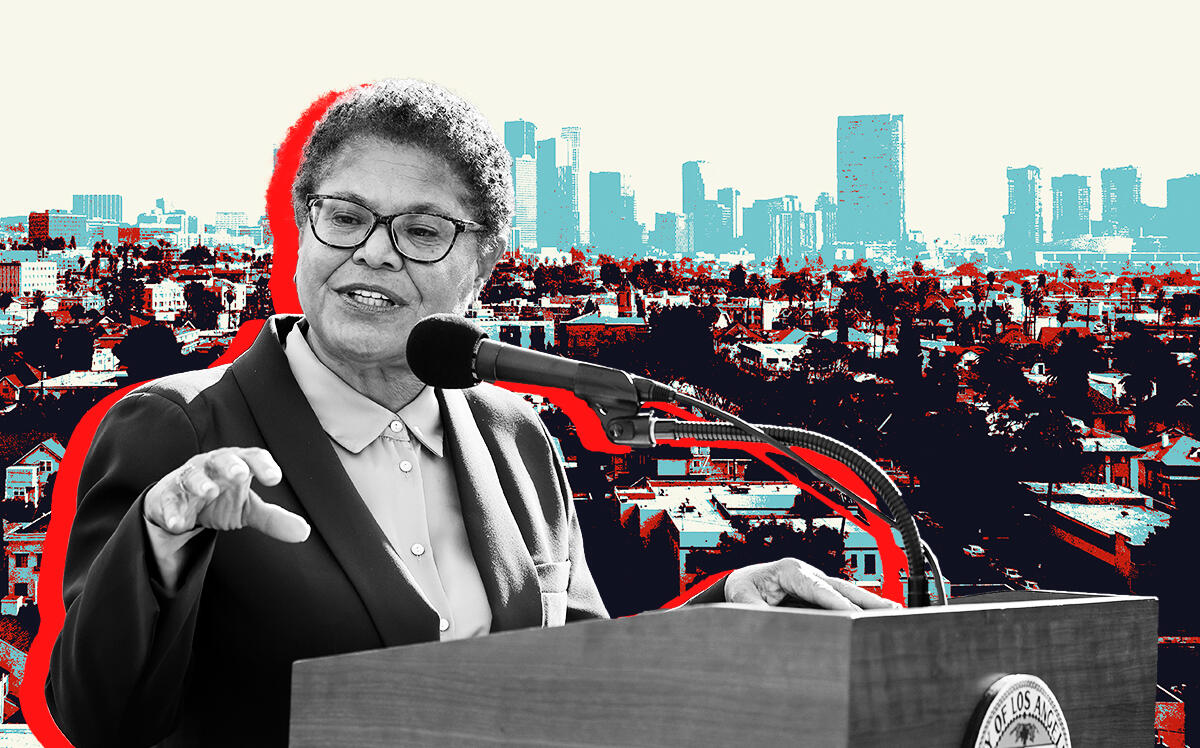 Mayor Bass declares homelessness emergency
Mayor Bass declares homelessness emergency
Trending
What do real estate professionals want from Karen Bass?
Wish list for LA’s new mayor includes landlord-tenant balance and fixing homelessness

For the first time in nearly a decade, L.A. has a new mayor. She isn’t the candidate the industry wanted. In Rick Caruso, many L.A. real estate players saw one of their own, according to a TRD analysis published in May, relatively early in the campaign cycle.
The analysis turned up campaign donations from more than 100 brokers and industry names that included Peter Morton, Branden and Rayni Williams, Geoff Palmer and Richard Weintraub — even as the billionaire mall developer was openly spending tens of millions of dollars of his own fortune.
That total would eventually climb to more than $100 million. But in the end, it was Karen Bass, a traditional politician who had the backing of the local and national Democratic establishment and won by a resounding 10 points.
As her tenure begins, L.A.’s real estate industry has a few items on its wish list.
Measure ULA
The city’s major transfer tax measure, which was passed by voters in November, is scheduled to take effect in April, and the real estate industry is freaking out. The measure imposes a new 4 percent tax on all property sales — commercial and residential — above $5 million, with the tax rising to 5.5 percent on sales above $10 million. The money will go towards solving the city’s homelessness crisis, but many industry folks argue the measure will both throw ice on an already cooling market and backfire completely by pushing development activity — and potential tax revenue — out of the city altogether.
“If we had a Christmas list, that would be my number one,” said Anthony Marguelas, the founder of luxury residential brokerage Amalfi Estates. “Repeal ULA.”
But Marguelas knows Bass doesn’t actually have authority to do that, so he and others are hoping she’ll do something — anything — to mitigate the new law’s impact. That could, hypothetically, include advocating for a repeal or significant amendments to the just-passed measure by voters. Or, somewhat more plausibly, pushing the L.A. City Council to pass new laws that would exempt certain property deals from the tax, such as those related to residential development — because not even proponents of the law intended for it to stifle construction.
Homelessness and crime
Bass was elected on a commitment to fix the city’s highly visible homelessness crisis, and she has already followed through on her promise to declare a homelessness emergency that grants her additional powers to expedite affordable housing construction. Over the past year or so the city’s rising crime (or at least the perception of it) also emerged as a central issue, a theme that was amplified when Bass’s own home was burgled in September.
The two issues loom especially large for L.A. real estate, because they strike at the heart of a question that impacts everything from Westside mansion deals to South L.A. apartment plans: How badly do people actually want to live here, especially when it’s seemingly cheaper just about anywhere else?
There is some optimism in the air. “I think for the first time we have the mayor and the county willing to work together on a solution,” said developer Richard Weintraub in reference to the homelessness crisis. “And we’ll just see what they can enact without wasting too much money.”
Approvals, approvals, approvals
For years developers have griped about the city’s slow permitting process, which wastes a lot of money and limits the overall housing stock. With so much focus on the city’s housing crisis, the previously insider issue wound up as a major theme of the mayoral race. As part of her homeless emergency order, Bass has also already ordered city departments to complete reviews for 100 percent affordable projects within 60 days.
Developers want her to extend that kind of red tape-cutting urgency to other housing projects. Paul Schon, of the firm Schon Tepler, pointed out that even his firm’s zoning-compliant proposals — which are mostly under 50 units to avoid the trigger for a potentially lengthy CEQA review — often languish in bureaucratic no-man’s land for over a year.
“I would love it if she could help with that by expediting by-right projects,” Schon said. “I think it’s feasible because she’s in charge of the building department.”
Another major red tape culprit that Bass could address? The city’s Department of Water and Power, which developers say causes months of delays on its own through painfully slow reviews and installations.
Landlord-tenant balance
L.A. is an expensive city where hundreds of thousands of renters are struggling to get by, and some of them have been abused, harassed and illegally pushed out by landlords.
But since the onset of the pandemic, as one emergency eviction moratorium gave way to an evolving jurisdictional soup of tenant-centered protections and extensions, area landlords — many of whom are struggling to keep their own lights on — have felt they were sacrificed at the city’s political altar.
In the eyes of politicians, landlords “have horns and a tail,” quipped Dan Yukelson, the executive director of the Apartment Association of Greater Los Angeles, the region’s fiercest landlord advocate. “We’re not even people.”
Going forward, much of the industry wants Bass to help restore what it sees as a more balanced approach, at least in her city, by inviting property owners to the table for policy discussions and tempering aggressive proposals of the City Council’s strongest tenant advocates.
Yukelson floated an unusual policy idea: City incentives to encourage private landlords to take on vulnerable and homeless tenants.
Culture reform
Just a few years ago — before the L.A. City Council was rocked by this fall’s racism scandal — it was rocked by one of the largest development scandals in U.S. history.
The city has passed measures aimed at preventing more corruption, including a ban on political donations by developers with major pending projects, but even as the fallout from former council member Jose Huizar’s alleged bags of cash remains ongoing, many developers complain about a City Hall culture that continues to concentrate approval power in the hands of individual members.
At the same time, city-funded affordable housing construction has been plagued by a general lack of accountability and ballooning costs: The most recent report from L.A. Controller Ron Galperin found the city was spending an average of $600,000 to build an affordable housing unit. The loose taxpayer cash certainly benefits some affordable developers, but most of the industry wants a culture change toward more transparency and accountability on city projects and contracts, including in the bidding process. As mayor, Bass can help set a new tone.
Read more
 Mayor Bass declares homelessness emergency
Mayor Bass declares homelessness emergency
 Election 2022: What does it mean for LA real estate?
Election 2022: What does it mean for LA real estate?




